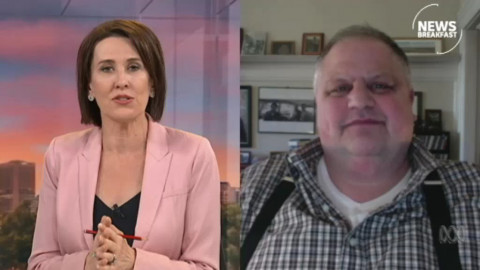
Hans Asperger's name may become "mud" and be scrapped from the medical lexicon following new evidence he was an active Nazi collaborator, an autism history expert says.
Key points:
- New study finds clinician cooperated with child euthanasia program
- Finds Asperger benefited from relationship with Nazis
- Challenges long-running narrative about Asperger
A new study, published in the journal of Molecular Autism this week by medical historian Herwig Czech, was the result of eight years of research and drew on previously unseen documents, including Asperger's personnel files and the clinical assessments he wrote on his patients.
It concluded that while Asperger was never a member of the Nazi Party, he "actively cooperated with the child 'euthanasia' program".
It found he also sent children to the notorious Am Spiegelgrund clinic in Vienna, where hundreds of disabled kids were murdered as part of the program to create a "pure" society.
The study challenges a long-running narrative that Asperger was an opponent of National Socialism and instead asserts that he gained favour with the Nazi regime and was rewarded with career opportunities.
Steve Silberman, an American writer and expert in the history of the autism spectrum disorder, said the latest revelations added to a growing body of research looking at Asperger's time during the war.
"This is actual evidence that Asperger's signature condemned at least a couple of children to death," he said.
"There's evidence he sat on a committee that decided whether children would live or die.
"So Asperger it seems was playing a very complicated game of appearing to be anti-Nazi, but meanwhile signing a couple of death warrants and perhaps sending some more children to Am Spiegelgrund."
Asperger first characterised a group of children with distinct psychological differences as "autistic" in 1938 and published a comprehensive study on the topic in 1944.
His findings gained international recognition in the 1980s and with it the term "Asperger syndrome" became common usage.
Those with the condition sometimes referring to themselves as "Aspi", and Silberman said this latest study could prompt a shift in terminology.
"I think it is up to the autistic people to decide how they want to use that term or not," he said.
Mr Silberman said the "bible of psychiatry" in the US — the Diagnostic and Statistical Manual of Mental Disorders — had already removed the term "Asperger syndrome" and replaced it with a broader definition around autism spectrum disorder.
He said the study could prompt a similar move elsewhere in the world.
"I think this will probably hasten [Asperger's syndrome's] removal from the international classification of diseases, which is still used in Europe," he said.
In the concluding remarks of his study, Mr Czech wrote he found no evidence Asperger's contributions to autism research itself was tainted by his relationship to the Nazis.
"They are, nevertheless, inseparable from the historical context in which they were first formulated," he wrote.
"The fate of 'Asperger's syndrome' will probably be determined by considerations other than the problematic historical circumstances of its first description — these should not, in any case, lead to its purge from the medical lexicon.
"Rather, it should be seen as an opportunity to foster awareness of the concept's troubled origins."
from http://www.abc.net.au/news/2018-04-20/hans-asperger-a-nazi-collaborator…

